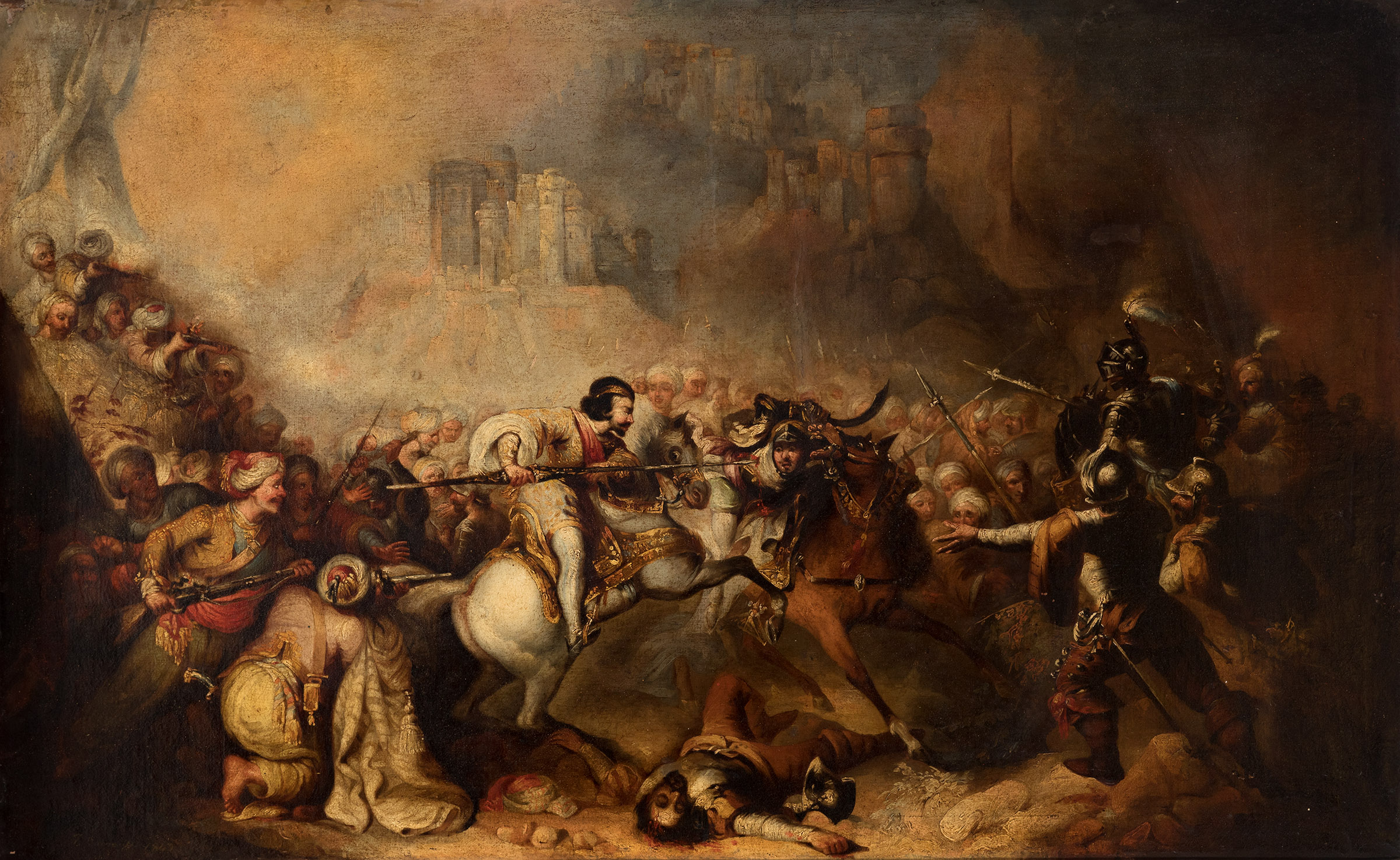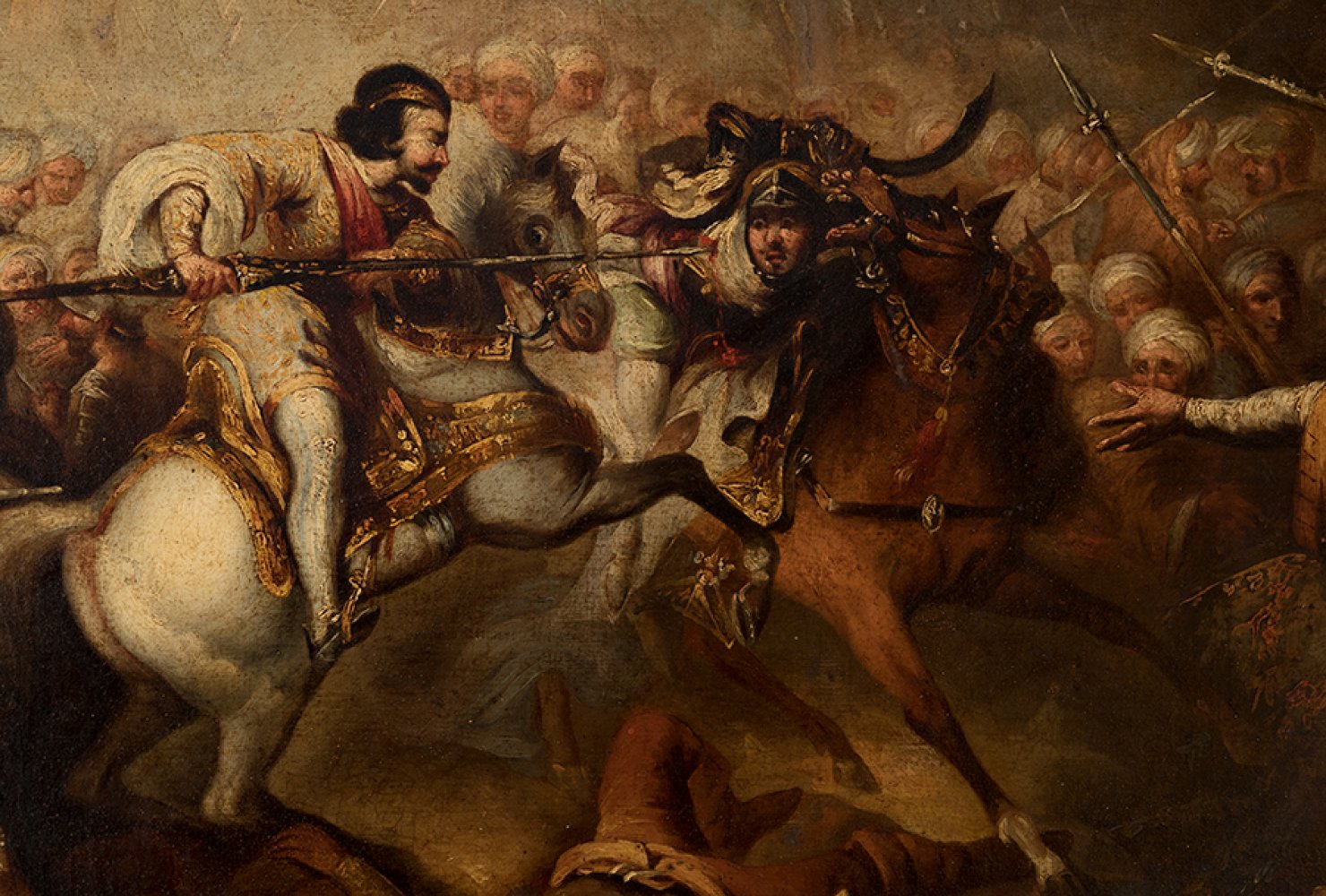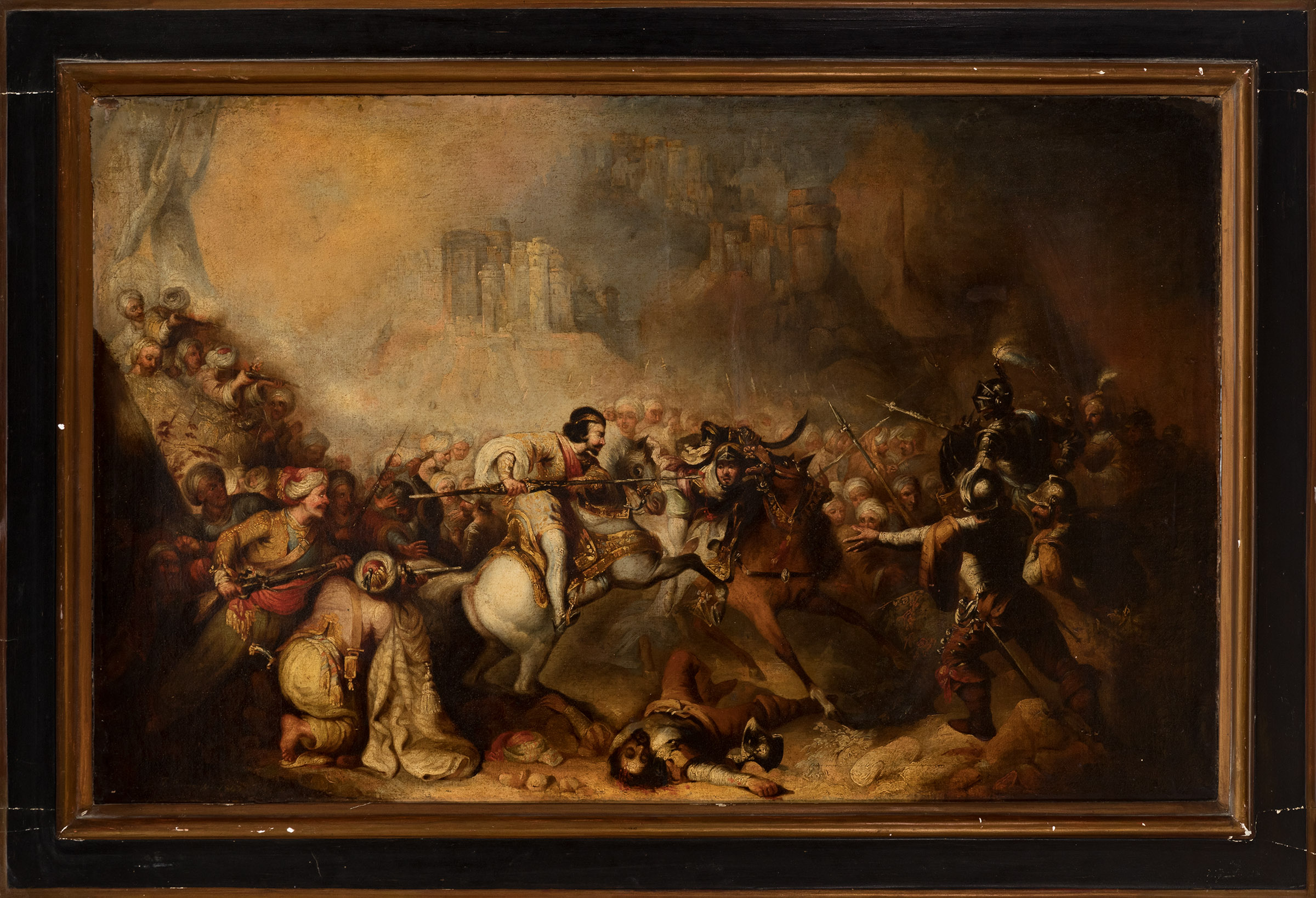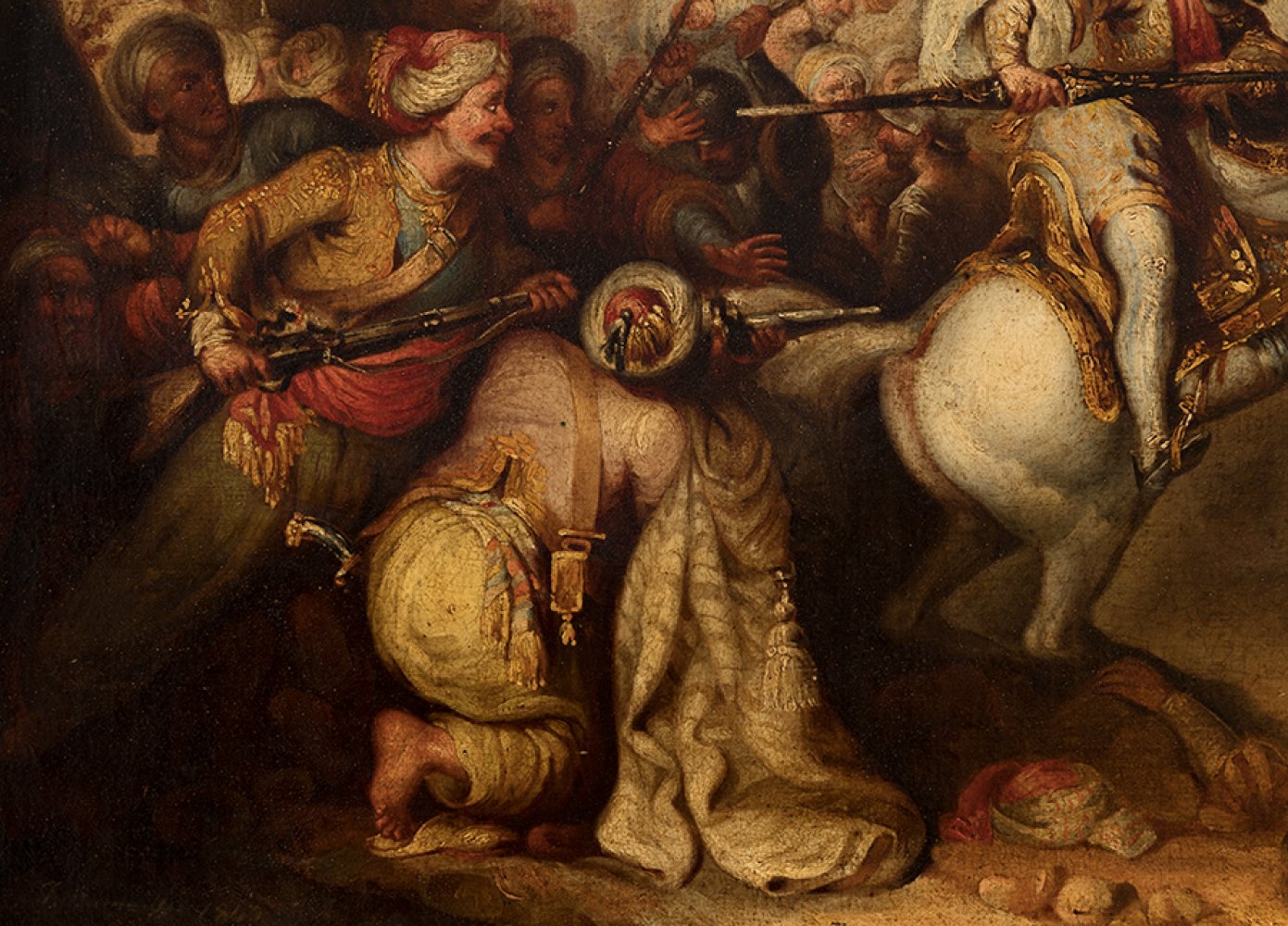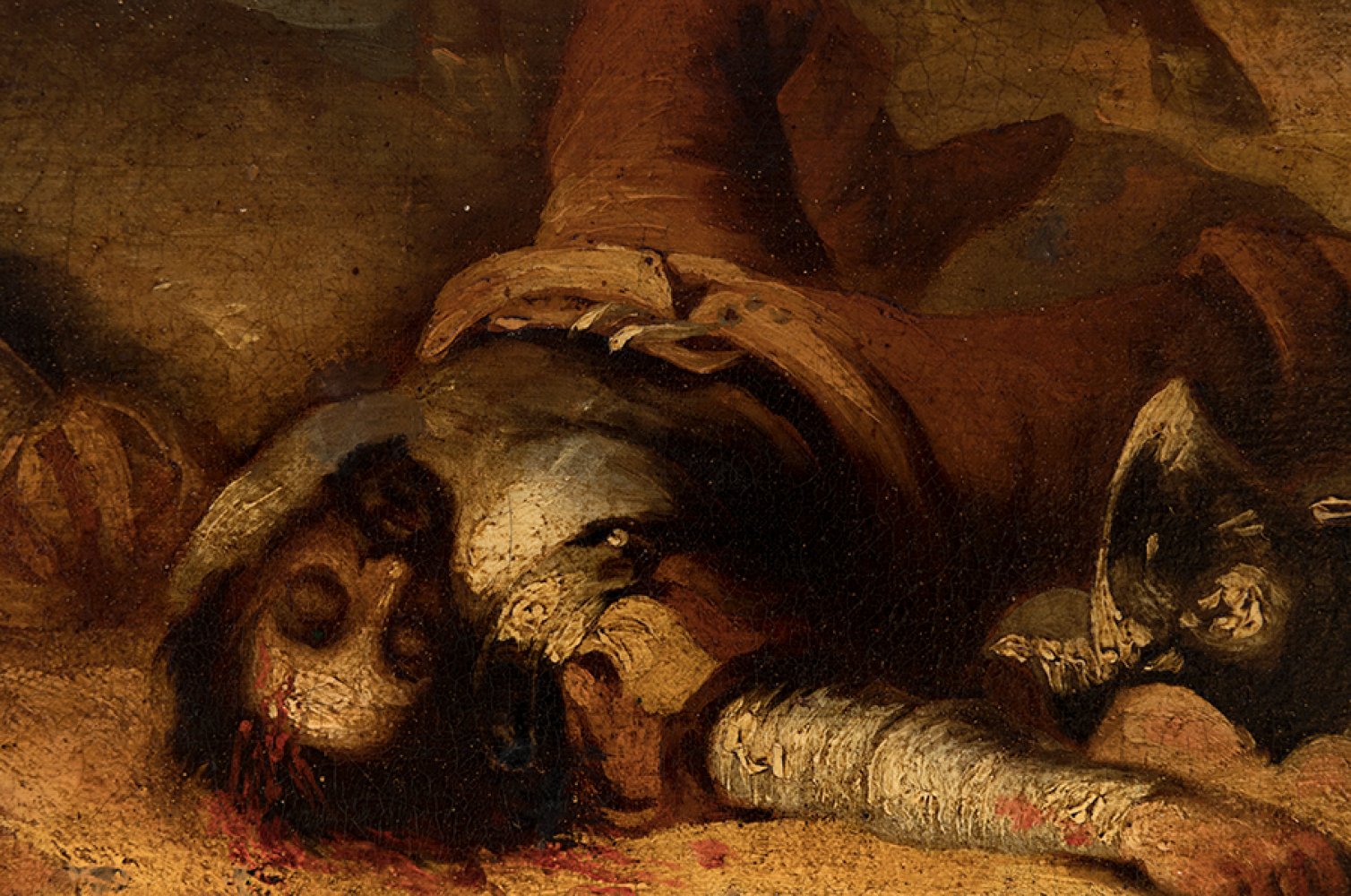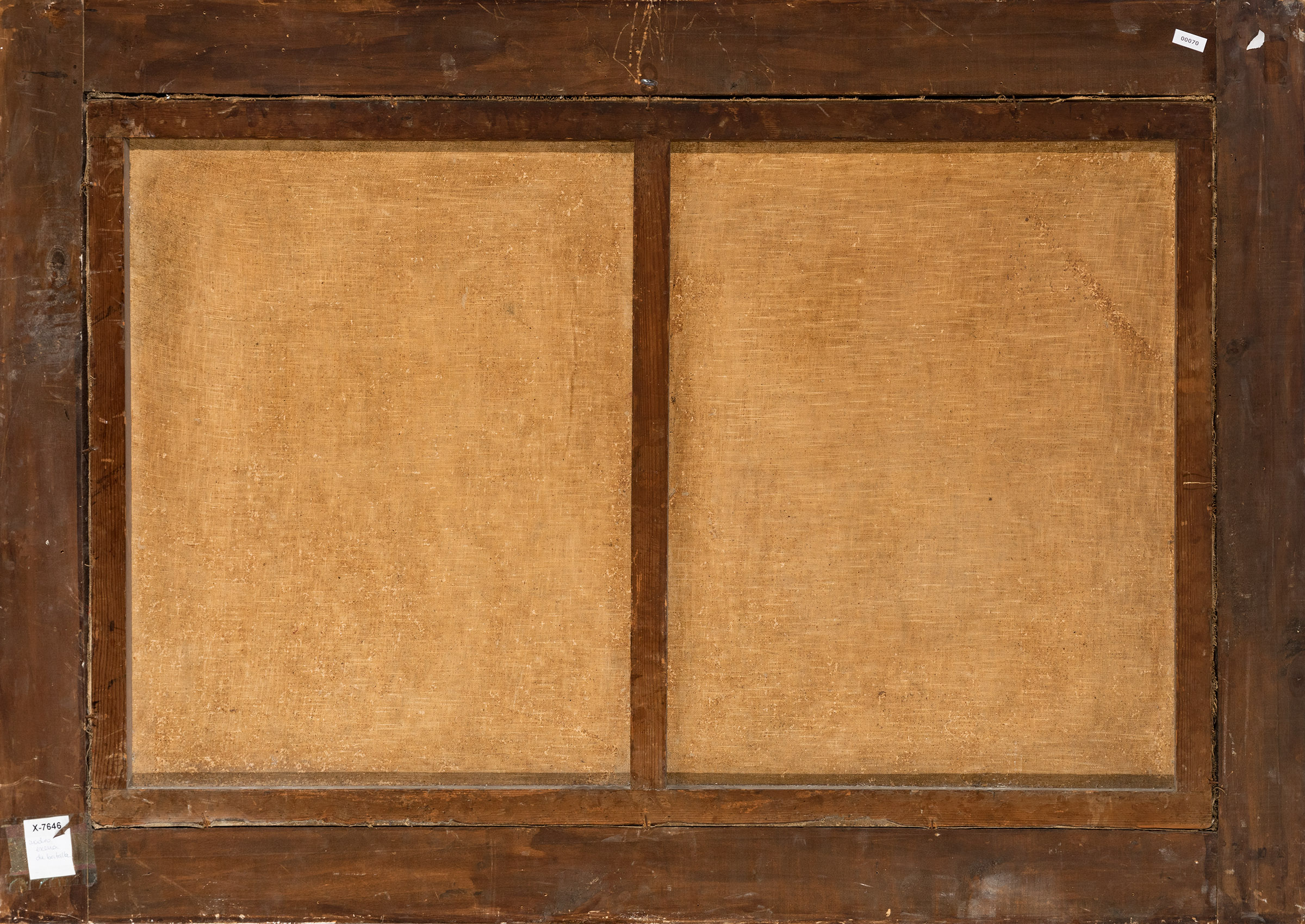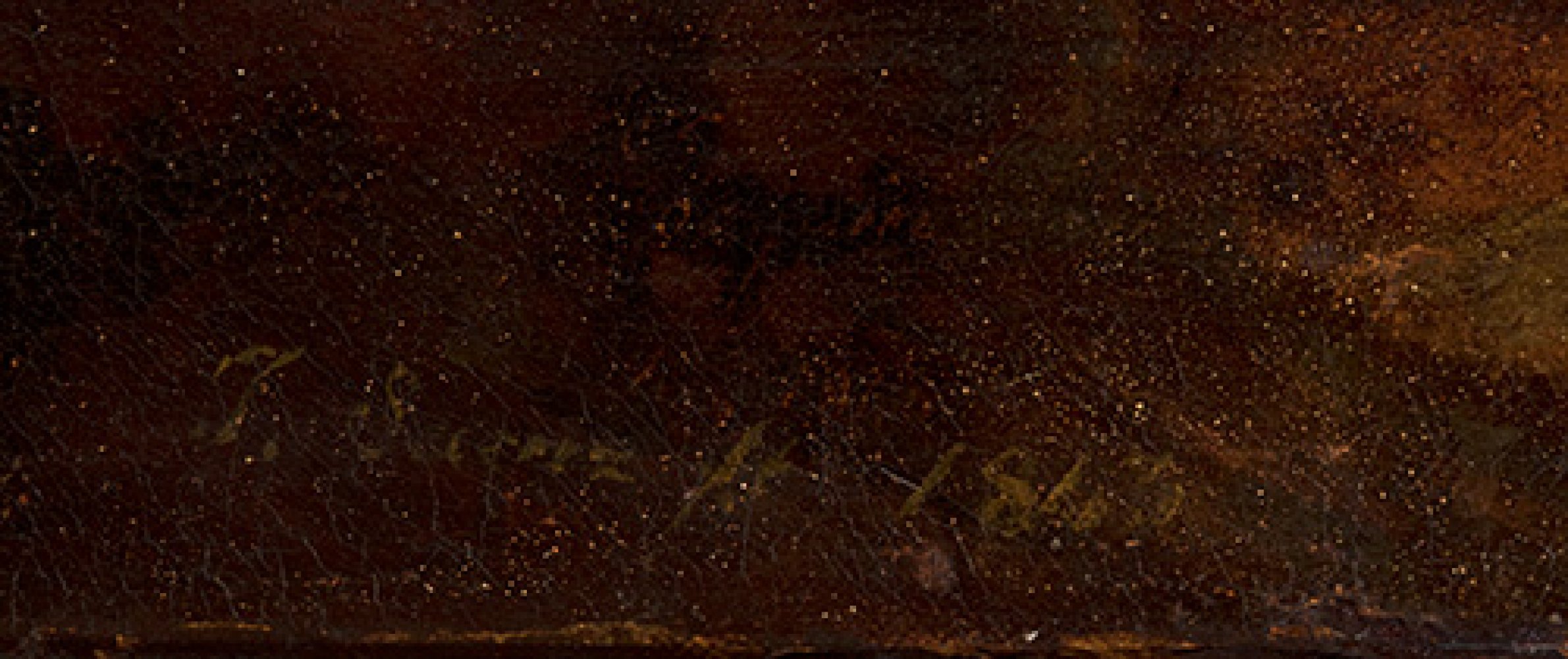2
Spanish Romantic School; circa 1840."Battle of the Reconquest.Oil on canvas.Preserves its original
1/7
Description
Spanish Romantic School; circa 1840.
"Battle of the Reconquest.
Oil on canvas.
Preserves its original canvas.
Slight traces of signs caused by xylophages in the frame.
Signed and dated in the lower right corner.
Measurements: 70 x 112 cm; 89,5 x 131,5 cm (frame).
In this oil painting the author captures a scene full of dramatism, dynamic and scenographic, captured with great naturalism, resulting in an asymmetrical and moving composition. The work is notable for the treatment of the light and the quality of the materials. The action is concentrated in the foreground, with the rider on a white horse on a cabriolet, who is besieging his enemy with a large lance, standing out in particular. This character is further emphasised by the pearly light of his clothes and his own horse, in combination with the brownish tones around him. In order to accentuate the drama of the scene, the painter also plunges the outer areas of the composition into semi-darkness, giving the work a dark, ominous tone. Both the group of figures and their battle animals are in fully active postures reflected in the haughty, attacking gestures, while the powdered finish used by the artist in the application of colour lends greater verism to this war scene.
It is worth mentioning that the theme is allusive to a historical event, perhaps the reconquest, as some of the figures are dressed in Arab costume and the main figure rides a white horse, which could well be Santiago. This type of scene was a very common thematic device during this period. Historicist incursions were initially inspired by scenes from Christian history, mythology or classical antiquity; however, in this case the scene is captured from a realist point of view despite the brushstrokes, the artist has conceived the work as if it were a documentary element, presenting himself as a witness to the events. History painting was traditionally considered the most important genre. This pre-eminence was explained by a certain concept that art had to offer noble and credible examples. Therefore, the superiority of those works of art in which what was narrated was considered lofty or noble was defended. However, in this case, as mentioned above, the author does not seek to narrate a story, but rather to show the gesture of action, chaos and movement typical of a war battle.
"Battle of the Reconquest.
Oil on canvas.
Preserves its original canvas.
Slight traces of signs caused by xylophages in the frame.
Signed and dated in the lower right corner.
Measurements: 70 x 112 cm; 89,5 x 131,5 cm (frame).
In this oil painting the author captures a scene full of dramatism, dynamic and scenographic, captured with great naturalism, resulting in an asymmetrical and moving composition. The work is notable for the treatment of the light and the quality of the materials. The action is concentrated in the foreground, with the rider on a white horse on a cabriolet, who is besieging his enemy with a large lance, standing out in particular. This character is further emphasised by the pearly light of his clothes and his own horse, in combination with the brownish tones around him. In order to accentuate the drama of the scene, the painter also plunges the outer areas of the composition into semi-darkness, giving the work a dark, ominous tone. Both the group of figures and their battle animals are in fully active postures reflected in the haughty, attacking gestures, while the powdered finish used by the artist in the application of colour lends greater verism to this war scene.
It is worth mentioning that the theme is allusive to a historical event, perhaps the reconquest, as some of the figures are dressed in Arab costume and the main figure rides a white horse, which could well be Santiago. This type of scene was a very common thematic device during this period. Historicist incursions were initially inspired by scenes from Christian history, mythology or classical antiquity; however, in this case the scene is captured from a realist point of view despite the brushstrokes, the artist has conceived the work as if it were a documentary element, presenting himself as a witness to the events. History painting was traditionally considered the most important genre. This pre-eminence was explained by a certain concept that art had to offer noble and credible examples. Therefore, the superiority of those works of art in which what was narrated was considered lofty or noble was defended. However, in this case, as mentioned above, the author does not seek to narrate a story, but rather to show the gesture of action, chaos and movement typical of a war battle.
Auction Details
Shipping
T&Cs & Important Info
Ask seller a question
Spanish Romantic School; circa 1840.
"Battle of the Reconquest.
Oil on canvas.
Preserves its original canvas.
Slight traces of signs caused by xylophages in the frame.
Signed and dated in the lower right corner.
Measurements: 70 x 112 cm; 89,5 x 131,5 cm (frame).
In this oil painting the author captures a scene full of dramatism, dynamic and scenographic, captured with great naturalism, resulting in an asymmetrical and moving composition. The work is notable for the treatment of the light and the quality of the materials. The action is concentrated in the foreground, with the rider on a white horse on a cabriolet, who is besieging his enemy with a large lance, standing out in particular. This character is further emphasised by the pearly light of his clothes and his own horse, in combination with the brownish tones around him. In order to accentuate the drama of the scene, the painter also plunges the outer areas of the composition into semi-darkness, giving the work a dark, ominous tone. Both the group of figures and their battle animals are in fully active postures reflected in the haughty, attacking gestures, while the powdered finish used by the artist in the application of colour lends greater verism to this war scene.
It is worth mentioning that the theme is allusive to a historical event, perhaps the reconquest, as some of the figures are dressed in Arab costume and the main figure rides a white horse, which could well be Santiago. This type of scene was a very common thematic device during this period. Historicist incursions were initially inspired by scenes from Christian history, mythology or classical antiquity; however, in this case the scene is captured from a realist point of view despite the brushstrokes, the artist has conceived the work as if it were a documentary element, presenting himself as a witness to the events. History painting was traditionally considered the most important genre. This pre-eminence was explained by a certain concept that art had to offer noble and credible examples. Therefore, the superiority of those works of art in which what was narrated was considered lofty or noble was defended. However, in this case, as mentioned above, the author does not seek to narrate a story, but rather to show the gesture of action, chaos and movement typical of a war battle.
"Battle of the Reconquest.
Oil on canvas.
Preserves its original canvas.
Slight traces of signs caused by xylophages in the frame.
Signed and dated in the lower right corner.
Measurements: 70 x 112 cm; 89,5 x 131,5 cm (frame).
In this oil painting the author captures a scene full of dramatism, dynamic and scenographic, captured with great naturalism, resulting in an asymmetrical and moving composition. The work is notable for the treatment of the light and the quality of the materials. The action is concentrated in the foreground, with the rider on a white horse on a cabriolet, who is besieging his enemy with a large lance, standing out in particular. This character is further emphasised by the pearly light of his clothes and his own horse, in combination with the brownish tones around him. In order to accentuate the drama of the scene, the painter also plunges the outer areas of the composition into semi-darkness, giving the work a dark, ominous tone. Both the group of figures and their battle animals are in fully active postures reflected in the haughty, attacking gestures, while the powdered finish used by the artist in the application of colour lends greater verism to this war scene.
It is worth mentioning that the theme is allusive to a historical event, perhaps the reconquest, as some of the figures are dressed in Arab costume and the main figure rides a white horse, which could well be Santiago. This type of scene was a very common thematic device during this period. Historicist incursions were initially inspired by scenes from Christian history, mythology or classical antiquity; however, in this case the scene is captured from a realist point of view despite the brushstrokes, the artist has conceived the work as if it were a documentary element, presenting himself as a witness to the events. History painting was traditionally considered the most important genre. This pre-eminence was explained by a certain concept that art had to offer noble and credible examples. Therefore, the superiority of those works of art in which what was narrated was considered lofty or noble was defended. However, in this case, as mentioned above, the author does not seek to narrate a story, but rather to show the gesture of action, chaos and movement typical of a war battle.
31st August -19th & 20th Century Arts
Sale Date(s)
Venue Address
Aragón 346, Barcelona
Calle Velázquez 7, Madrid
Carrer de Cirilo Amorós 55, Valencia
Barcelona
08009
Spain
General delivery information available from the auctioneer
Setdart offers Worldwide shipping
PICK UP IN ROOM: You can come and pick up your lots in our offices (Barcelona, Madrid or Valencia). At the moment of the withdrawal, you will be able to accept the current conditions of the lot by means of a document that you will sign.
YOU CAN SEND ANOTHER PERSON TO PICK UP: This person must present a signed authorization that you can find in our web page by accessing from BUY AT SETDART- LOGISTICS-DOWNLOAD AUTHORIZATION DOCUMENT. You can also send an e-mail with the requested data in AUTHORIZATION DOCUMENT to admin@setdart.com
Important Information
25% buyer´s premium
21% buyer´s premium at www.setdart.com















